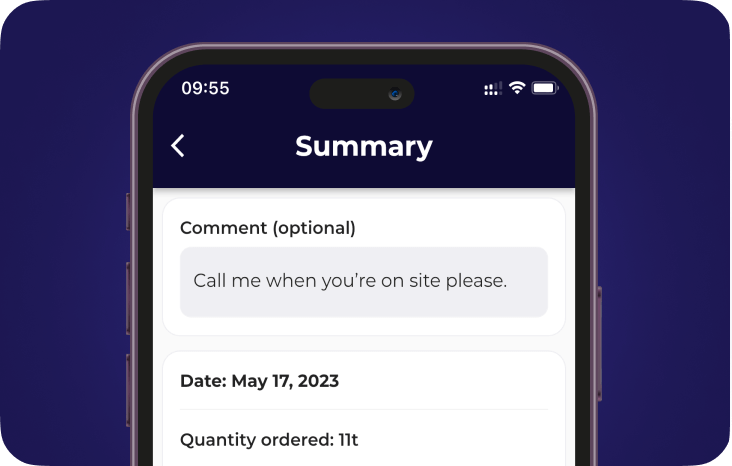
Revolutionize your livestock feed inventory management with BinConnect
Request a demo




Business challenges
Are unplanned empty feed bins a daily concern for you?


Rushed planning changes
Empty feed bins
Last minute deliveries
Unnecessary overtime
Do not let unplanned empty feed bins disrupt your operations again
Solution
This is how we solve your problems

Fill level & forecast
Whether you are on the farm, in an office or on vacation, monitor inventory up to 4 days ahead

Automated alerts

Easy ordering tool
Implementation
Improve operations with BinConnect's practical solutions


A simple sensor for big gains
Non-intrusive
Easy to install
Remote calibration
Long battery life
Maintenance free
Patented technology
Real-time monitoring directly on your smartphone
Push notification
Real-time data
Forecast (D+4)
Ordering tool



Additional advanced monitoring from your office
Upgrade your experience with our ergonomic web-based platform. Discover multiple features, enjoy advanced filters, historical data, interactive maps and program alerts. No need to download software. Enjoy unlimited user access online. You can also easily integrate our data with your existing system through an API.
The same features as on mobile, but also:
Filters
Alerts setup
Access management
API Integration
Request a demo
Support
Premium customer support: your success, our priority
No matter where you are (on the farm, in the office, on the go) or what the situation is, we are just a call, message, or email away! From installation to daily use of our solution, our team of experts is with you every step of the way. BinConnect was developed hand in hand with you, our valued customers, and your feedback has shaped our customer-centric approach.


Benefits
The reasons why our users choose BinConnect
Why feed suppliers rely on BinConnect

Safety
From installation to daily inventory management, forget about climbing on feed bins, everything is done at ground level
Ease of use
From large-scale deployment to data visualization anywhere, everything has been designed to simplify your life
Efficiency
Save money, optimize your resources and improve your delivery routes by anticipating your customers' needs
Customer support
You are never left on your own, we assist you from the initial installation and throughout your daily usage.
Why farm managers rely on BinConnect

Serenity
No more feed shortage, your animal will always have the right quantity of feed at the right time
Safety
Forget about climbing to the top of the feed bins mostly in bad weather conditions and save valuable time
Non-intrusive
The sensor is installed outside the feed bin tank and on a single leg regardless of its shape
FAQ
Everything you need to know
- Sensor
- Interfaces
- Installation
- General
Absolutely, our solution is 100% wireless. There is no need for any specific cable work or connections. The electronic part of our device, along with the mechanical components, operates autonomously on a replaceable battery. Moreover, we offer various sensor versions to address any connectivity issues. These sensors use a multi-operator cellular network to transmit data or, in the absence of a cellular network, a 0G (low-power) network version is available for seamless data transmission.
No matter if it is a plastic or metallic one, as long as your feed bin is set on legs, in good conditions, our sensor can be quickly and easily installed. The chosen leg should firmly rest on the ground, be well-maintained, shielded from excessive sunlight, not used for filling the bin and not cluttered. A simple procedure and installation video are available, as well as online support by e-mail, telephone or even WhatsApp with our team if required.
With our special kit, installation is quick and easy, it takes less than 20 min to install a sensor. And only one sensor per feed bin is required.